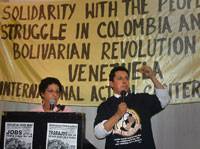Solidarity with Colombia's workers, Venezuela's revolution
By
Frank Neisser
Boston
Published Apr 27, 2005 2:18 PM
An enthusiastic, militant
crowd heard a strong program here in solidarity with the people’s
struggles in Colombia and Vene zuela on April 23. The meeting, at the union
hall of the Boston School Bus Driv ers Union, USWA Local 8751, was co-chair ed
by Jorge Marin of the Martin Luther King Boli varian Circle and Berta
Joubert-Ceci of the Inter national Action Center.
|
From left, the IAC's Berta Joubert-Ceci
and SINALTRAINAL's Gerardo Cajamarca.
|
The featured speaker of
the evening was Gerardo Cajamarca, a leader of the SINALTRAINAL union in
Colombia that is at the forefront of the struggle of Coca-Cola work ers there
and the international Boy cott Killer Coke campaign. A City Coun cil member from
1999-2003 in the Munici pality of Facatativa, Cundina marca, he was elected with
the support of the popular sectors, unions and social movements that struggle
for better living conditions.
Cajamarca is in the United States with his
family as a political refugee due to threats he and his family faced in Colom
bia from paramilitaries because of his work as a human rights defender and
community leader.
Cajamarca showed the crowd moving photos of trade union
leaders in Colombia assassinated by the death squads of the Uribe government.
The killings have escalated in recent months. In the world, nine out of every 10
trade union leaders assassinated over the last year were Colombian.
Steve
Gillis, president of the Boston School Bus Drivers Union, had just come back
from the Third International Con ference in Solidarity with the Bolivarian
Revolution in Venezuela. He described a moving meeting with paper workers who,
with the support of their revolutionary government, have occupied and taken over
their factory after having been locked out by their bosses. Gillis conveyed the
excitement of seeing first-hand an ongoing revolutionary process that is
consciously moving toward socialism and putting the resources in the hands of
the people.
Jorge Marin and Berta Joubert-Ceci, who also had been on the
delegation to the Venezuelan conference, spoke of the solidarity of delegations
from around the world. Joubert-Ceci described the Boli varian history of
Colombia and Venezuela, which had originally been one country.
Roxbury
City Councilor Chuck Turner called for taking the example of the Vene zuelan
revolution to raise the level of fighting back right here at home. He projected
weekly or daily actions, in the spirit of Martin Luther King’s Poor
Peoples Campaign, demanding economic justice here at home.
Dario Zapata of
the Permanent Com mittee for Colombian Peace spoke of the struggle of democratic
forces in Colombia against the Uribe government.
The event was rounded
out by Rhode Island Colombian activist Elvira Busta mante, who explained the
Free Trade Area of the Americas and how it destroys the livelihood of people in
Latin America as well as the sovereignty of countries subordinated to the
dictates of the IMF and the World Bank.
In a subsequent meeting with a
small group of dedicated activists, Cajamarca was enthused to hear about the
struggle of maintenance workers at the Bromley Heath Housing Project, who
attended the meeting, as well as the Million Worker March Movement. He looked
forward to raising the issue of Colombia at the May Day demonstration in New
York City and to building broader actions on the 120th anniversary of May Day in
2006.
Articles copyright 1995-2012 Workers World.
Verbatim copying and distribution of this entire article is permitted in any medium without royalty provided this notice is preserved.
Workers World, 55 W. 17 St., NY, NY 10011
Email:
[email protected]
Subscribe
[email protected]
Support independent news
DONATE


